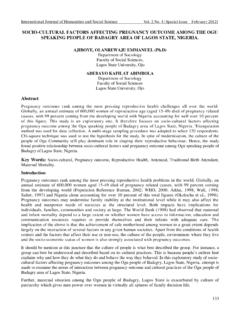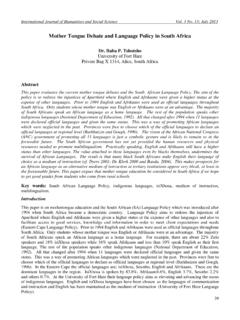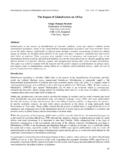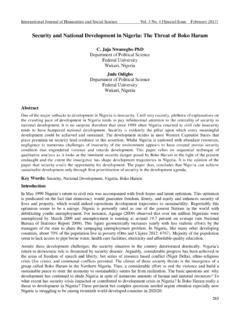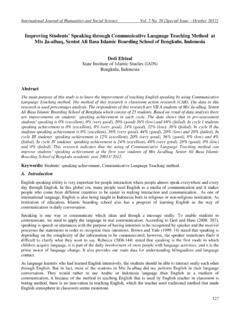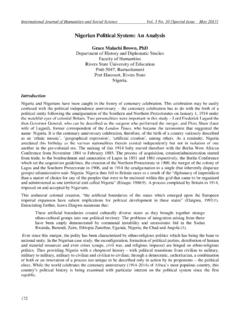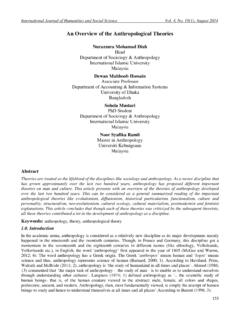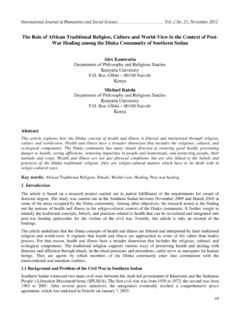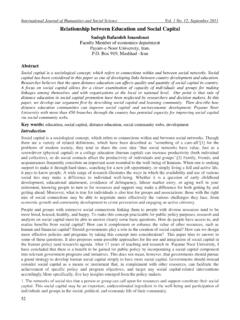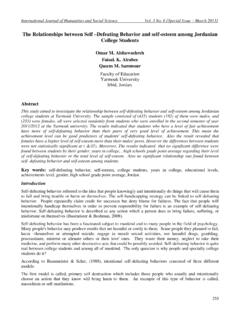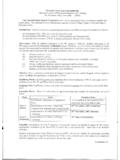Transcription of The Challenges and Benefits of Study Abroad - ijhssnet.com
1 International Journal of Humanities and Social Science Vol. 6, No. 5; May 2016 16 The Challenges and Benefits of Study Abroad Hamad Alghamdi Doctoral Candidate Edgewood College 1255 Deming Way Madison, WI 53717 USA Suzanne Otte, Doctoral Writing Specialist Edgewood College 1255 Deming Way Madison, WI 53717 USA Abstract This literature review summarizes the Challenges and Benefits of Study Abroad opportunities. The increasing numbers of students studying Abroad has created problematic situations for higher education institutions and for students. For institutions, providing adequate institutional and personal support for students studying Abroad has been difficult. Students who Study Abroad face Challenges related to language barriers, social integration issues, and financial Challenges .
2 Despite these Challenges , the increasing number of Study Abroad students has created opportunities and Benefits for institutions and students. These Benefits include financial gains on the part of the institution, the opportunity for cross cultural understanding and global awareness for host institutions and for domestic and international students. Recommendations for support of international students are given. Key Words: Study Abroad , international students, domestic students, international education, higher education, social integration, cross-cultural. Introduction In recent years, studying Abroad has increased rapidly (Oosterbeek & Webbink, 2011). Between 1972 and 1973 nearly 146,000 international students studied in the United States. This number increased to approximately 974,926 international students in 2015 (Institute of International Education, 2015).
3 International students have become an important source of economic contributions toward host countries and educational institutions (Paltridge, Mayson, & Schapper, 2012). An Association of International Educators in the United States (NASFA, 2015) analysis found that in the 2014-2015 academic years, international education contributed $ billion to the economy. And, international education provided more than 373,000 jobs to the economy (Institute of International Education, 2015). Several scholars have paid attention to the international education phenomenon and to the Challenges that face international students ( Andrade, 2006; Barratt & Huba, 1994; Chen, 1999; Constantine, et al., 2005; Sheehan & Pearson, 1995; Yi, Lin, & Kishimoto, 2003). Studies indicate that foreign students deal with a variety of adjustment issues when they live or Study Abroad .
4 As an example, one of the surveys conducted by Lin and Yin (1997) showed that international students faced a wide range of issues such as accommodation problems, language difficulties, discrimination, financial issues, and cultural misunderstanding. So, as the number of international students rapidly increases, it is important to diagnose and get a better understanding of adjustment issues that encounter international students. Also, Paltridge et al. (2012) confirmed that there is a need to improve methods and strategies for supporting international students, socially, economically, academically, and psychologically. ISSN 2220-8488 (Print), 2221-0989 (Online) Center for Promoting Ideas, USA 17 1. Chinese Students studying Abroad China is a country which has realized the importance of studying Abroad .
5 Zhang (2000) reported that Deng Xiaoping, a leader of China Republican from 1978-1992, realized the importance of studying Abroad to increase the knowledge of Chinese students and bring what they learned back to their community to be used properly. The decision to send Chinese students and professionals to Study Abroad during that time was an important factor to decrease the Chinese isolation and to communicate with Western countries. In 1978, China started to shape open relations with international and foreign societies after a period of segregation which led to a number of students studying Abroad (Zhang, 2000). At that time, Jianjun (2012) found that Chinese students felt pressure from both global and domestic forces to abandon some old habits and traditions which made them welcome these changes.
6 Now numerous Chinese students are studying Abroad . In particular, in the United States, the Institute of International Education (2014) reported in 2013-2014 that there were 274,439 Chinese students in the United States. 2. Benefits of Hosting International Students International students have become important source of revenue for many countries. A number of countries, including the United States, host international students as part of their strategic plans to function effectively in an age of globalization and as a way to increase their revenues (Harryba, Guilfoyle, & Knight, 2011). The Association of International Educators (NAFSA, 2015) reported that in 2009 international education contributed more than $ billion to the United States economy.
7 In the 2014-2015 academic years, the revenue from international education increased almost doubled and contributed $ billion to the United States economy (NASFA, 2015). Australia is also among those countries that put hosting international students as one of their major strategies. For instance, international students play a vital role, particularly in the Australian economy. Mariginson (2011) stated that international education is considered the fourth largest revenue source in Australia. According to the Australian Education International (2011), the economic contribution of international students to the Australian economy was nearly $ billion in fiscal year 2009. As a result, Paltridge et al. (2012) found that the revenues from international education showed a significant contribution to Australian's economy and its educational system.
8 In addition to tangible economic contributions, international students bring several non-economic Benefits to the hosting countries. For instance, in Australia, Adams, Banks, and Olsen (2011) gave a wide range of Benefits of international education such as an increase of public commerce and diplomacy, an enrichment of educational climate culturally for domestic students, and enhancement of the awareness of diversity among all students. Therefore, international students bring cultural diversity to the host country (Olivas & Li, 2006). Numerous researchers ( Kell & Vogel, 2008; Mahat & Hourigan, 2007) claim that international education reinforces intercultural interaction. This interaction minimizes racism and increases tolerance between people (Bochner, 1986; de Wit, 1995, Gudykunst, 1998).
9 At the same time, international students often benefit from living and studying in a foreign country. Domestic students benefit from international students as well. In the United States, American students benefit from the enhancement of their cultural skills and their sensitivity in working with people from different cultures (Calleja, 2000; Carnevale, 1999). Most international students are satisfied with their living and studying Abroad . In Australia for example, a survey conducted by the Australian Federal Government reported that approximately 86% of surveyed international students from all educational institutions were satisfied with their experience of living and studying in Australia (Commonwealth of Australia, 2010). 3. International Student Issues Despite the advantages of international education, international students encounter a wide range of issues when they live and Study Abroad .
10 Those issues are generally related to language difficulties, adaptation to a new learning system, psychological problems such as homesickness, discrimination, and feeling isolated, as well as socio-cultural problems with health care and financial systems (Tseng & Netwon, 2002). Other issues include financial difficulties, depression, and culture shock (Khoo et al., 2002; Leong & Chou, 1996; Lin & Yi, 1997). The United States has attracted the largest number of students from all over the world (Sandhu, 1995). However, international students attending American universities and colleges frequently encounter issues and Challenges related to adjustment in their new academic and social environment (Alsharideh & Geo, 1998). International Journal of Humanities and Social Science Vol.
